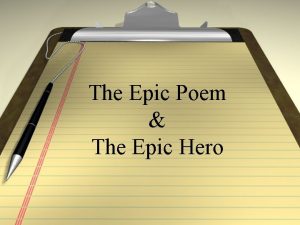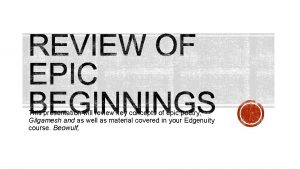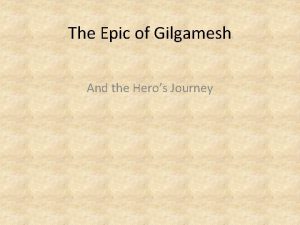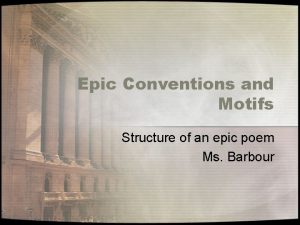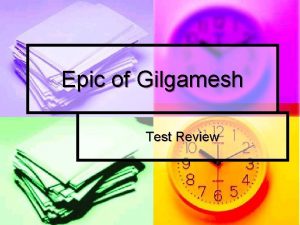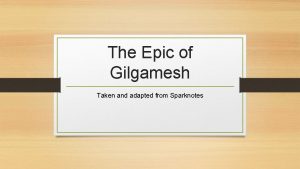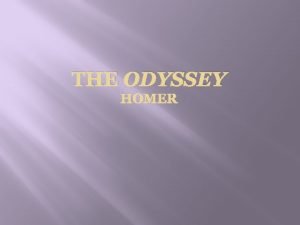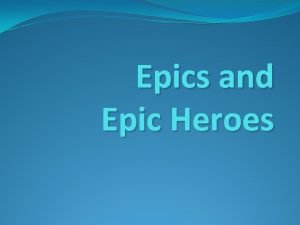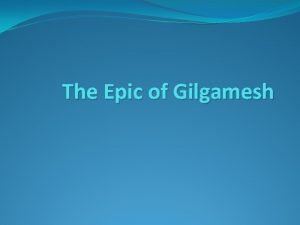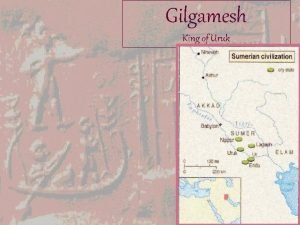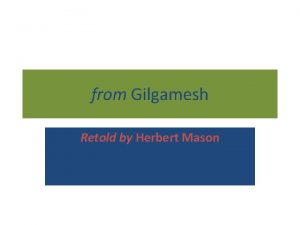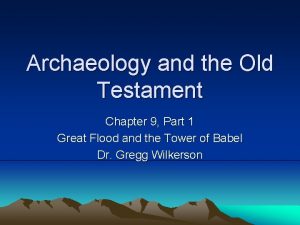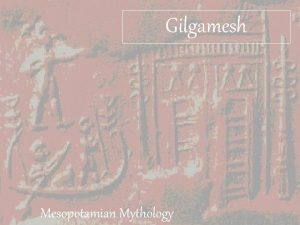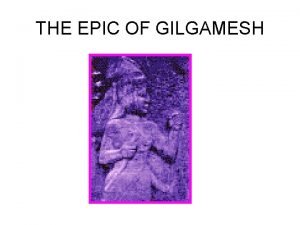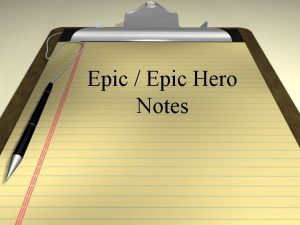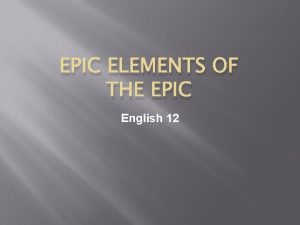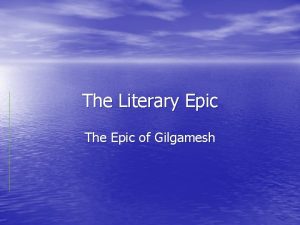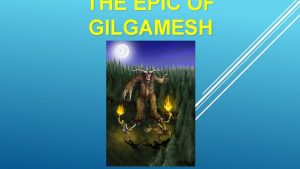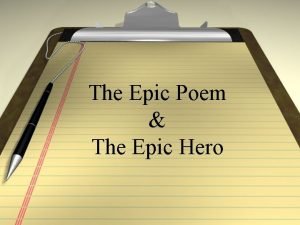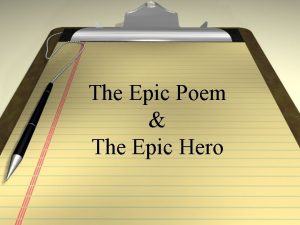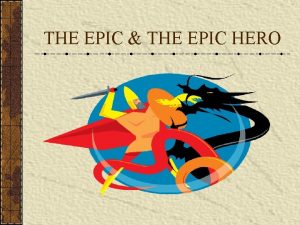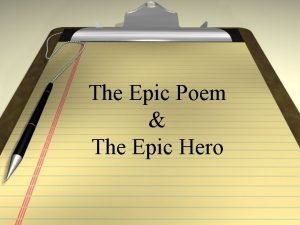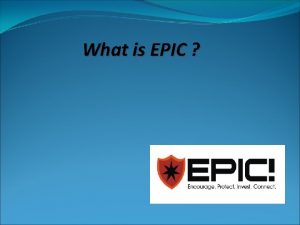THE EPIC OF GILGAMESH ENGLISH 10 The Gilgamesh














- Slides: 14

THE EPIC OF GILGAMESH ENGLISH 10

The Gilgamesh Epic: (adj) spectacular; very impressive; awesome (http: //dictionary. reference. com/browse/epic) Epic: (n) a long narrative poem describing the adventures of a hero. Epic hero: an important figure from a history or legend, usually favored by or even partially descended from deities, but aligned more closely with mortal figures in popular portrayals. (http: //en. wikipedia. org/wiki/Epic_hero)

Epic of Gilgamesh: named after a Sumerian King who lived between 2700 and 2500 BC. It describes an era about 23 times more distant than our own Revolutionary War Themes: How to become known and respected How to cope with the loss of a dear friend How to accept one’s own inevitable death

How did it endure? The story was told and handed down by Sumerians hundreds of years after his death. 21 st century BC it was put in written form by a Babylonian author who wrote the beginning portion of it. The Babylonians conquered the Sumerians and inherited their culture. Other Babylonian authors added or revised details and parts of the story. Central Theme: The search of immortality. After the fall of Babylonia, the story was lost. It was rediscovered in the ancient Assyrian Library, written in cuneiform.

The story of the “Arrogant King” Gilgamesh is king of Uruk, and Ancient Sumerian city. He is eager for fame Gods and goddesses would intervene in his life and give him challenges. The goddess Ururu creates Enkidu, a wild man who lives in the mountains.

Gilgamesh and Enkidu fight/wrestle and then become good friends. Quests: Battles the giant, Humbaba, the Bull of Heaven, and fights off lions. He searches for Utnapishtim, sole survivor of the great flood to get the answer to everlasting life. He fights man-scorpions, travels with the ferryman of death He doesn’t find everlasting life, but learns to understand his mortality.

Archetype: A hero’s quest Archetype: a basic plot, character, symbol or idea that recurs in literature of many cultures. A hero’s quest: an archetype where and extraordinary person goes on a difficult journey/mission in search of a person, place or object of value, or to find the answer to a problem or puzzling question; or some other special knowledge. Gilgamesh: Searches for the secret to immortality

Literary focus: Characterization: how the character is created or developed. Authors do this through: Direct statements Characters actions, speech, thoughts. Descriptive details

Reading Strategy: Understanding cultural context Gilgamesh was a real Sumerian King, and learning about the culture in which he livedand in which it grew and changed- will illuminate the work. Follow these steps to understand the cultural context: Learn a little about the historical background Look for clues about how people lived, worked or believed (writing materials they used, agriculture or power of gods) Use the story margins to annotate the story

Background Gilgamesh was an epic story told by storytellers in ancient Mesopotamia, a region between the Tigris and Euphrates Rivers. Life in the desert region was subject to poverty and plenty, opportunity and danger. Frequent floods: enriched the soil, but were unpredictable. Flat lands left cities open to invaders Religious views: Underworld was a sad place full of anger Gods were too human

Gilgamesh: culture of hero The hero goes through a number of ordeals that leads to suffering, but also to a special knowledge or understanding that could otherwise not have been gained. Gilgamesh’s bravery was something admired and needed in a culture and time of tribal invasions. Gilgamesh was 2/3 god, 1/3 human

What are the characteristics of an epic hero? Excels in skill, strength, and courage Succeeds in war and adventure Values honor and glory Usually has a guide Battles demons or monsters Is generous to his followers but ruthless to enemies

Is a man of action Accepts challenges and sometimes invites problems Sometimes make rash decisions and takes unnecessary risks Meets monsters and temptations Encounters women who tempt him Descends into darkness (often the underworld)

Final project for this unit? Argument essay: choose a modern-day hero. Argue the validity of this hero as an “epic hero”.
 Part 3: writing to analyze the epic hero in gilgamesh
Part 3: writing to analyze the epic hero in gilgamesh Epic poem
Epic poem The hero's journey epic of gilgamesh
The hero's journey epic of gilgamesh Structure of an epic
Structure of an epic Gilgamesh match the following
Gilgamesh match the following Belit sheri
Belit sheri The epic of gilgamesh sparknotes
The epic of gilgamesh sparknotes Ano ang natuklasan ni henry rawlinson noong 1847?
Ano ang natuklasan ni henry rawlinson noong 1847? Homer's first epic poem
Homer's first epic poem Epic hero stories
Epic hero stories Gilgamesh accomplishments
Gilgamesh accomplishments Gilgamesh lover
Gilgamesh lover Gilgamesh herbert mason
Gilgamesh herbert mason Godgate gilgamesh
Godgate gilgamesh Gilgamesh goddess
Gilgamesh goddess
